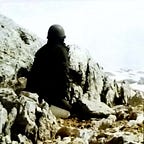[Review] “The Philosophy of Language/في فلسفة اللغة” by Kamal Youssef El-Hage
A Doctor of Philosophy and head of the department of philosophy at the Faculty of Arts at the Lebanese University, Kamal Youssef El-Hage translated most of Henri Bergson’s works to Arabic, such as Time and Free Will in 1946. This translation inspired him to author The Philosophy of Language in 1956, his first major work.
Is this all there is to language?
A question that often lingers at the back of our minds, especially when faced with the complexities of human communication. Like many, I once viewed language as merely a tool for communication, a set of rules and structures to be memorized and applied. Yet, as I delved into Kamal Youssef El-Hage’s The Philosophy of Language, my perspective changed.
Written in Arabic, this book covers the philosophical elements of language making it a challenging read for those unfamiliar with philosophical discourse, especially in Arabic. In The Philosophy of Language, Dr. Kamal El-Hage discusses the interaction between language and the human experience. He shows that language is more than just a tool for speaking but a key part of human consciousness.
Thus, language is useful speech that signifies meaning. It is a composition of words that, when assigned to each other, produce meaning. Words that mean nothing, in an uninformative sentence, are not considered language. Letters are not language in themselves; they only become language when they convey emotional content; thus becoming an emotion
— Kamal Youssef El-Hage, “The Philosophy of Language”
إذن اللغة كلام مفيد يدل إلى معنى. هي تتركب من ألفاظ أسندت إحداها إلى الأخرى ليصدر عن هذا الإسناد معنى. أما الألفاظ التي لا تعني شيئاً، في جملة غير مفيدة، فلا اعتبار لها. هي ليست لغة. ذلك أن الحروف المركبة لا تكون لغة، إلا إذا ؛ دلت إلى فحوى وجداني؛ فكانت وجداناً
“كمال يوسف الحاج، ”في فلسفة اللغة —
1. Language and Environment
Dr. Kamal El-Hage discusses the role of language in defining and expressing cultural and national identities. With an emphasis on language in Lebanon, he discusses how language influences Lebanese social norms, educational practices, and even political discourse, as a practical example of the deep connection between language and national identity.
Additionally, regarding the Arabic language, he advocates for a balanced approach that respects its historical significance while also embracing the linguistic diversity and changes that come with evolving cultural dynamics like in Lebanon. He warns of the dangers of allowing language to become a tool of political manipulation. He showed how ruling powers often impose their language on subjugated peoples as a means of weakening cultural and national identities, making the population more controllable.
2. Language and Human Nature
Dr. Kamal El-Hage argues that language can be both a means and an end, basing himself on the different opinions on the utility of language. Some philosophers believe that understanding the positions of words helps in understanding inner experiences, making language an end (Louis de Bonald), while others see language as a means to convey thoughts and feelings but not as the ultimate goal (John Locke). The author emphasizes that man is a social animal who need language to express his thoughts and interact with others. This social necessity is the foundation of language.
3. Critique of Language
Dr. Kamal El-Hage’s analysis is heavily influenced by Henri Bergson’s philosophical understanding of language. El-Hage frequently references Bergson’s concept of duration “الديمومة” and how it applies to the understanding of language as a dynamic entity. Intuition “البديهية” is central to comprehending Bergson’s notion of duration.
Bergson’s philosophy highlights the inadequacies of language in itself to fully capture the essence of human experience “الوجدان” and consciousness. El-Hage builds on this, showing how language, despite its richness, often falls short in expressing the depth of human emotions and thoughts. El-Hage points out that through intuition, one can understand the continuous flow of time. Real understanding requires an intuitive grasp beyond the limitations of linguistic expression.
4. Art and Language
Despite his initial critique, Dr Kamal El-Hage praises the beauty and musicality of well-crafted prose and poetry, referencing literary figures, such as Lamartine and Mikhail Naimy, acknowledging that while language may have its limitations, it also possesses the power to evoke profound emotional responses and convey complex ideas through artful expression.
Reasons to read
- Know how language works as a central component of personal identity
- Understand language as a dynamic entity that shapes human consciousness.
However, the book is dense with complex ideas and philosophical arguments that may be challenging for readers unfamiliar with the subject, making the book more suitable for an academic audience or readers with a strong interest in linguistics and philosophy.
